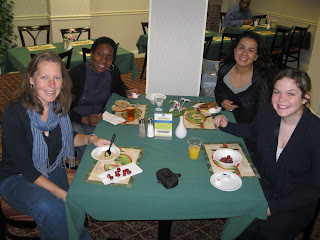 |
| The Saint Mike's Crew at Vermont CARES' Evening of Reflection |
This year, SGAC, together with additional students from my new course on the Millennium Development Goals (MDGs) decided to organize our World AIDS Day advocacy and education around the MDGs, drawing the connections between them and the global AIDS pandemic. There were talks and panel discussions, a great turnout in support of Vermont CARES, our local AIDS service organization at their annual night of reflection and remembrance, and a die-in in the school cafeteria to highlight the number of preventable deaths occurring around the world because of lack of access to treatment and prevention services. But as usual, the largest amount of energy went into the political advocacy with which we ended the week, our annual rally at the offices of Senators Leahy and Sanders.
 |
| Kate and Josh working on rally posters |
This year, the focus of the rally was the problem that has emerged in a number of developing countries because of the US government's failure to keep its commitments to scale up the AIDS treatment programs it has begun in many of the most AIDS-affected countries in the world under President George W. Bush. These programs have saved the lives of millions of people, but they work because of the promise of continued treatment. This is the incentive that brings people in for testing and prevention education; this is the way to keep children from being orphaned; and this is the way to start to reverse the devastating impact to families and communities caused by untreated HIV infection. President Obama had pledged to keep these programs growing when he was campaigning for President, but now both his and Congress' commitment to that pledge appears to be wavering. Thus, we decided that the theme for this year's rally would be "Keep the Vow" and we dressed in wedding apparel (veils and bow ties, anyway) to drive the message home.
 |
| Jerry, Rachel and I getting ready for the rally |
 |
| In front of Senator Leahy's office |
 |
| Connor leading some chants while we waited to talk to a staff member from Senator Sander's office |
 |
| The Saint Mike's Crew -- Emily, Siham, Jamila and I -- at breakfast |
We spent Saturday and Sunday meetings at George Washington University with other AIDS activists from all kinds of places and professions. There were student and grassroots activists, doctors, lawyers, professors, community organizers and staff of advocacy and service organizations. There was Elizabeth, who currently lives in Maryland, but immigrated from Cameroon. There were a number of longtime community activists from the vibrant advocacy organization ACT UP Philadelphia. Paul and Jen flew in from Kenya, and there were contingents of students from Harvard, Yale, Columbia and a number of other schools. Together we spent two days (and a number of people came a day earlier or stayed a day later to lobby in the Hill) strategizing and figuring out what it would take at both the national and international levels to increase the levels of treatment around the world.
As a professor who teaches about and participates in social movements, I sometimes encounter students (and colleagues) who question the value and appropriateness of political activism. For some, it seems too strident and confrontational; others wonder how it can achieve its aims when it often angers the people it seeks to influence. Still others question the focus on problems outside our borders -- why spend money outside when there are problems at home? Weeks like this one remind me of my responses to these questions. Although it is true that it will cost billions of dollars to provide AIDS treatment for all who need it around the world, it's also true that Americans spend 8 billion dollars on pet food every year, and over 30 billion on weight loss products. Surely, we can and must value the lives of millions of fellow human beings around the world at least this much. As for the tactics of activists, its true that sometimes they are strident, and upsetting to the people on whom demands are made as well as bystanders who might be inconvenienced. Yet these same tactics have helped level the playing field for Gandhi and King and many, many other activists with less money and power than those they were challenging.
 |
| A brainstorming session |
 |
| Emily writes up her small group's conclusions |

Awesome post on an awesome week. I had a great time this weekend!
ReplyDelete..So if this entry has moved you, be in touch. We all have something to contribute. And It's guaranteed fun. Thanks Trish.
ReplyDeleteI'm just glad you're didn't get thrown in jail, again.
ReplyDelete